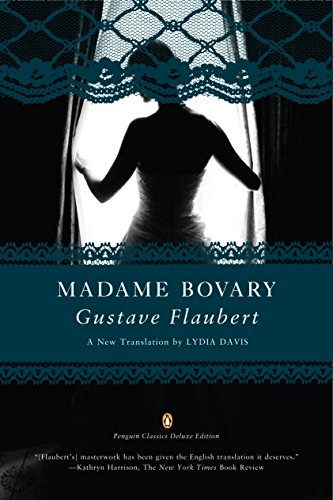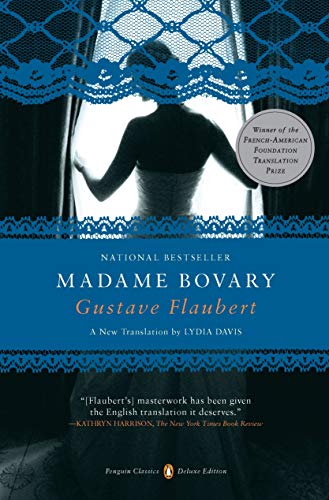Oh boy, have I got a book to chat about! Welcome to my review of Madame Bovary by Gustave Flaubert, a tale that tosses you into the drama of dreams, deceit, and dreadful decisions. I remember when I first flipped through these pages; my cat decided to take a nap on them. Guess she was drawn in by the realism of Flaubert’s world too! This novel’s elegance paints vivid images through characters like Emma Bovary, who dances between dreams and reality with the grace of a toddler in a ball pit. But fear not! Flaubert’s verbosity isn’t just there to make you sound smart in a coffee shop. It crafts a critique of the bourgeois life that’ll leave you nodding in agreement or maybe just asleep from the detail. Let’s see if this literary powerhouse is worth your cozy reading chair. Grab your cup of tea—or whatever keeps you awake—and let’s get into it!
In a nutshell
Madame Bovary by Gustave Flaubert is a classic novel that falls under the genre of literary realism. The book is a captivating tale filled with intrigue, romance, and tragedy. Flaubert paints a vivid picture of 19th-century provincial France with his intricate details and exquisite prose. The story follows Emma Bovary, a complex character who dreams of a more exciting life than her mundane reality offers.
Flaubert delves deep into themes of desire, existential dissatisfaction, and the consequences of unrealistic expectations. He masterfully critiques the bourgeoisie lifestyle and societal norms of the time. With its rich exploration of human nature, Madame Bovary encourages readers to reflect on their own desires and the pursuit of happiness.
Emma Bovary: A Beautifully Tragic Transformation
Emma Bovary, the protagonist of Gustave Flaubert’s timeless classic, “Madame Bovary,” experiences one of the most mesmerizing and heartbreaking character transformations I’ve ever come across. At the start, she reminds me of my teenage self, dreaming of a life filled with luxury and passion. It’s like she’s caught in a perpetual daydream, almost like the time I thought I could learn guitar in a weekend because I watched some YouTube tutorials.
Madame Bovary’s character arc takes a deep plunge into despair—a bit like when my dog ate my favorite pair of shoes. Emma’s initial romanticism and infatuation with fantasy lead her down a path of disillusionment. Her constant yearning for a life beyond her provincial existence feels both relatable and painfully naive. Emma’s attempts to escape her mundane reality, by engaging in affairs and lavish spending, spiral out of control. Her inability to reconcile with her reality amplifies her downward spin, turning her life into chaos.
One could say Emma Bovary is a cautionary tale about what happens when expectations meet reality and reality wins by a landslide. As much as you want to root for her, Flaubert crafts Emma’s descent with such precision that one can’t help but feel a pang of heartbreak. This tragic transformation is, however, the beauty of “Madame Bovary” and an excellent reminder to keep daydreams in check. I mean, I still haven’t mastered the guitar.
Stay tuned as I unravel how realism plays a pivotal role in the story’s gripping tale.
Realism in ‘Madame Bovary’: A Slice of 19th Century Life
Gustave Flaubert did a fantastic job bringing realism to life in Madame Bovary. Can you imagine living in the 19th-century French countryside? I can, thanks to Flaubert’s vivid descriptions. He paints a picture so real you can almost smell the baguettes baking in the village oven and hear the gossiping townsfolk. Flaubert didn’t just skim the surface; he grabbed a shovel and dug deep into human nature and daily life, much like me trying to find my keys every morning.
Flaubert’s meticulous attention to detail is both impressive and a little terrifying. The man could spot a fleck of dust on a character’s shoe from a mile away! This attention to detail makes the scenes and characters jump off the page, bringing Emma Bovary’s world into sharp focus. It’s like watching a 3D movie without the glasses. Flaubert captures the monotony of provincial life and Emma’s constant longing for something more. I relate, because just like Emma, I often find myself longing for a snack after finishing a whole pizza—I want what I can’t have!
Realism in this novel doesn’t just show up in scenes, but in emotions and relationships. Flaubert doesn’t sugarcoat them; the rawness hits you like a cold shower or my dog’s wet nose at 6 AM. This approach makes the triumphs and tribulations of the characters feel authentic and relatable, much like my own misadventures with IKEA furniture.
Next, let’s explore how this realistic style serves as a platform for biting social critique and commentary… get your magnifying glass ready!
Social Critique and Commentary in Madame Bovary
Gustave Flaubert didn’t just write a novel to entertain; he crafted a social critique so sharp it could cut baguette like butter. Madame Bovary is a biting commentary on the 19th-century French bourgeoisie—perfect for those who love their novels with a side of satire.
Through Emma Bovary’s saga, Flaubert explores society’s unrealistic expectations and the ever-present pressure to conform. Emma yearns for a life of passion and romance, a stark contrast to her mundane existence in provincial Yonville. Her constant dissatisfaction highlights the materialism and superficiality that plagued bourgeois society like an itchy wool sweater. Her dreams of grandeur clash humorously—and tragically—with her reality, sparking a critique on the shallow pursuit of happiness.
I remember reading this during a high school book club meeting. Picture this: a room full of teenagers attempting to grasp the meaning of materialism while comparing Emma’s spending habits to our own addiction to the latest sneakers. It was gold! We couldn’t help but laugh over Emma’s obsession with new things and how she runs herself (and her finances) into ruin trying to keep up appearances, much like us trying to keep up with trending memes on social media. Flaubert’s portrayal of Emma’s eventual downfall serves as a cautionary tale, reminding us to mind the gap between want and need.
Flaubert’s subtle yet scathing critique of provincial life is something that many of us can relate to, even today. His ability to capture human folly and societal pressures so accurately is what makes this novel a timeless classic. And speaking of timeless, let’s wander into the whimsical world of Gustave Flaubert’s unique writing style next!
Exploring Gustave Flaubert’s Writing Style in Madame Bovary
Gustave Flaubert’s writing style in Madame Bovary could be best described as detailed, precise, and sometimes a bit like a French restaurant menu. You get every detail, down to the croissant flake in the coffee. I mean, Flaubert sure knew how to paint a picture! One of his biggest strengths is his ability to bring characters and settings to life with rich descriptions. You can almost smell the provincial dreams evaporating in the stale air of Emma’s world.
He’s known for his meticulous approach, and rumor has it he rewrote his sentences over and over. It’s like he was playing literary Jenga, making sure not a single word would cause the tower to tumble down! Flaubert was one meticulous dude. The rhythm of his prose in Madame Bovary is both methodically constructed and beautifully melodic, much like a symphony of words where each note is spot on. His use of free indirect discourse lets us eavesdrop on characters’ inner thoughts without the awkwardness of obvious monologues.
Speaking of thoughts, Flaubert had a knack for exploring the inner lives of his characters, exposing the conflicts and contradictions that make them more human than hero. Though, let’s be real, sometimes the detail can bog you down a bit, like stepping into quicksand of verbosity. But if you hang on, it’s worth the ride!
Do I recommend Madame Bovary for its writing style? Absolutely! Even if you find yourself trimming some paragraphs, the artistry behind each sentence is worth a visit to Flaubert’s wordy world. Just keep a baguette handy for sustenance!
Conclusion
I’ve reached the end of this whirlwind tour of Madame Bovary. Gustave Flaubert delivers realism with a sharpened quill, sketching Emma’s vibrant dreams and eventual demise. I enjoyed the humor injected in the mundane, but sometimes old Gustave went overboard with his wordy musings. Yet, we forgive him for the artistry in dissecting human desire and societal pretensions. If you’re game for a book that compels you to think while occasionally scratching your head over Flaubert’s verbosity, grab this classic! Just remember, you’ll need a strong cup of coffee. Or two. In the end, Emma leaves us pondering our own dreams and realities… hopefully minus the tragic endings. Bon appétit, literarily speaking!



